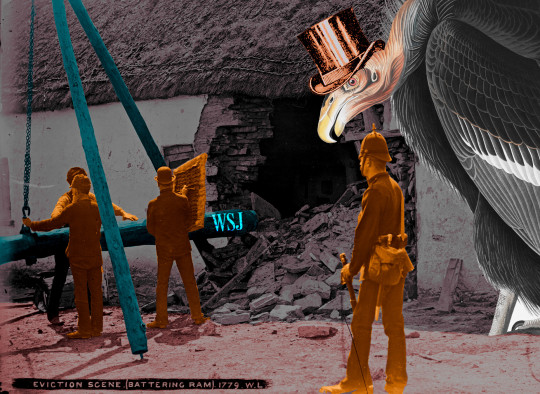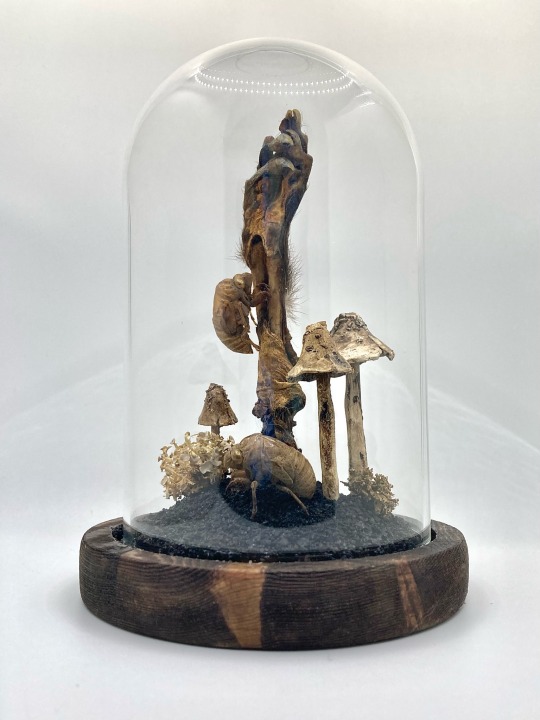#zombie vulture
Text












The GORILLAZTOBER challenge! by limee gorillaz (from Twitter) 1/2
#gorillaz#gorillaz ocs#flamingo#emo girl#mermaid#gorillaz chel#halloween#gorillaztober2023#zombie vulture#gorillaz phase 1#gorillaz phase 2#gorillaz phase 3#demon days#phenex#plastic beach#birdz#gorillaz tour#2D x oc
2 notes
·
View notes
Text
Wall Street Journal goes to bat for the vultures who want to steal your house

Tonight (June 5) at 7:15PM, I’m in London at the British Library with my novel Red Team Blues, hosted by Baroness Martha Lane Fox.
Tomorrow (June 6), I’m on a Rightscon panel about interoperability.

The tacit social contract between the Wall Street Journal and its readers is this: the editorial page is for ideology, and the news section is for reality. Money talks and bullshit walks — and reality’s well-known anticapitalist bias means that hewing too closely to ideology will make you broke, and thus unable to push your ideology.
That’s why the editorial page will rail against “printing money” while the news section will confine itself to asking which kinds of federal spending competes with the private sector (creating a bidding war that drives up prices) and which kinds are not. If you want frothing takes about how covid relief checks will create “debt for our grandchildren,” seek it on the editorial page. For sober recognition that giving small amounts of money to working people will simply go to reducing consumer and student debt, look to the news.
But WSJ reporters haven’t had their corpus colossi severed: the brain-lobe that understands economic reality crosstalks with the lobe that worship the idea of a class hierarchy with capital on top and workers tugging their forelacks. When that happens, the coverage gets weird.
Take this weekend’s massive feature on “zombie mortgages,” long-written-off second mortgages that have been bought by pennies for vultures who are now trying to call them in:
https://www.wsj.com/articles/zombie-mortgages-could-force-some-homeowners-into-foreclosure-e615ab2a
These second mortgages — often in the form of home equity lines of credit (HELOCs) — date back to the subprime bubble of the early 2000s. As housing prices spiked to obscene levels and banks figured out how to issue risky mortgages and sell them off to suckers, everyday people were encouraged — and often tricked — into borrowing heavily against their houses, on complicated terms that could see their payments skyrocket down the road.
Once the bubble popped in 2008, the value of these houses crashed, and the mortgages fell “underwater” — meaning that market value of the homes was less than the amount outstanding on the mortgage. This triggered the foreclosure crisis, where banks that had received billions in public money forced their borrowers out of their homes. This was official policy: Obama’s Treasury Secretary Timothy Geithner boasted that forcing Americans out of their homes would “foam the runways” for the banks and give them a soft landing;
https://pluralistic.net/2023/03/06/personnel-are-policy/#janice-eberly
With so many homes underwater on their first mortgages, the holders of those second mortgages wrote them off. They had bought high-risk, high reward debt, the kind whose claims come after the other creditors have been paid off. As prices collapsed, it became clear that there wouldn’t be anything left over after those higher-priority loans were paid off.
The lenders (or the bag-holders the lenders sold the loans to) gave up. They stopped sending borrowers notices, stopped trying to collect. That’s the way markets work, after all — win some, lose some.
But then something funny happened: private equity firms, flush with cash from an increasingly wealthy caste of one percenters, went on a buying spree, snapping up every home they could lay hands on, becoming America’s foremost slumlords, presiding over an inventory of badly maintained homes whose tenants are drowned in junk fees before being evicted:
https://pluralistic.net/2022/02/08/wall-street-landlords/#the-new-slumlords
This drove a new real estate bubble, as PE companies engaged in bidding wars, confident that they could recoup high one-time payments by charging working people half their incomes in rent on homes they rented by the room. The “recovery” of real estate property brought those second mortgages back from the dead, creating the “zombie mortgages” the WSJ writes about.
These zombie mortgages were then sold at pennies on the dollar to vulture capitalists — finance firms who make a bet that they can convince the debtors to cough up on these old debts. This “distressed debt investing” is a scam that will be familiar to anyone who spends any time watching “finance influencers” — like forex trading and real estate flipping, it’s a favorite get-rich-quick scheme peddled to desperate people seeking “passive income.”
Like all get-rich-quick schemes, distressed debt investing is too good to be true. These ancient debts are generally past the statute of limitations and have been zeroed out by law. Even “good” debts generally lack any kind of paper-trail, having been traded from one aspiring arm-breaker to another so many times that the receipts are long gone.
Ultimately, distressed debt “investing” is a form of fraud, in which the “investor” has to master a social engineering patter in which they convince the putative debtor to pay debts they don’t actually owe, either by shading the truth or lying outright, generally salted with threats of civil and criminal penalties for a failure to pay.
That certainly goes for zombie mortgages. Writing about the WSJ’s coverage on Naked Capitalism, Yves Smith reminds readers not to “pay these extortionists a dime” without consulting a lawyer or a nonprofit debt counsellor, because any payment “vitiates” (revives) an otherwise dead loan:
https://www.nakedcapitalism.com/2023/06/wall-street-journal-aids-vulture-investors-threatening-second-mortgage-borrowers-with-foreclosure-on-nearly-always-legally-unenforceable-debt.html
But the WSJ’s 35-paragraph story somehow finds little room to advise readers on how to handle these shakedowns. Instead, it lionizes the arm-breakers who are chasing these debts as “investors…[who] make mortgage lending work.” The Journal even repeats — without commentary — the that these so-called investors’ “goal is to positively impact homeowners’ lives by helping them resolve past debt.”
This is where the Journal’s ideology bleeds off the editorial page into the news section. There is no credible theory that says that mortgage markets are improved by safeguarding the rights of vulture capitalists who buy old, forgotten second mortgages off reckless lenders who wrote them off a decade ago.
Doubtless there’s some version of the Hayek Mind-Virus that says that upholding the claims of lenders — even after those claims have been forgotten, revived and sold off — will give “capital allocators” the “confidence” they need to make loans in the future, which will improve the ability of everyday people to afford to buy houses, incentivizing developers to build houses, etc, etc.
But this is an ideological fairy-tale. As Michael Hudson describes in his brilliant histories of jubilee — debt cancellation — through history, societies that unfailingly prioritize the claims of lenders over borrowers eventually collapse:
https://pluralistic.net/2022/07/08/jubilant/#construire-des-passerelles
Foundationally, debts are amassed by producers who need to borrow capital to make the things that we all need. A farmer needs to borrow for seed and equipment and labor in order to sow and reap the harvest. If the harvest comes in, the farmer pays their debts. But not every harvest comes in — blight, storms, war or sickness — will eventually cause a failure and a default.
In those bad years, farmers don’t pay their debts, and then they add to them, borrowing for the next year. Even if that year’s harvest is good, some debt remains. Gradually, over time, farmers catch enough bad beats that they end up hopelessly mired in debt — debt that is passed on to their kids, just as the right to collect the debts are passed on to the lenders’ kids.
Left on its own, this splits society into hereditary creditors who get to dictate the conduct of hereditary debtors. Run things this way long enough and every farmer finds themselves obliged to grow ornamental flowers and dainties for their creditors’ dinner tables, while everyone else goes hungry — and society collapses.
The answer is jubilee: periodically zeroing out creditors’ claims by wiping all debts away. Jubilees were declared when a new king took the throne, or at set intervals, or whenever things got too lopsided. The point of capital allocation is efficiency and thus shared prosperity, not enriching capital allocators. That enrichment is merely an incentive, not the goal.
For generations, American policy has been to make housing asset appreciation the primary means by which families amass and pass on wealth; this is in contrast to, say, labor rights, which produce wealth by rewarding work with more pay and benefits. The American vision is that workers don’t need rights as workers, they need rights as owners — of homes, which will always increase in value.
There’s an obvious flaw in this logic: houses are necessities, as well as assets. You need a place to live in order to raise a family, do a job, found a business, get an education, recover from sickness or live out your retirement. Making houses monotonically more expensive benefits the people who get in early, but everyone else ends up crushed when their human necessity is treated as an asset:
https://gen.medium.com/the-rents-too-damned-high-520f958d5ec5
Worse: without a strong labor sector to provide countervailing force for capital, US politics has become increasingly friendly to rent-seekers of all kinds, who have increased the cost of health-care, education, and long-term care to eye-watering heights, forcing workers to remortgage, or sell off, the homes that were meant to be the source of their family’s long-term prosperity:
https://doctorow.medium.com/the-end-of-the-road-to-serfdom-bfad6f3b35a9
Today, reality’s leftist bias is getting harder and harder to ignore. The idea that people who buy debt at pennies on the dollar should be cheered on as they drain the bank-accounts — or seize the homes — of people who do productive work is pure ideology, the kind of thing you’d expect to see on the WSJ’s editorial page, but which sticks out like a sore thumb in the news pages.
Thankfully, the Consumer Finance Protection Bureau is on the case. Director Rohit Chopra has warned the arm-breakers chasing payments on zombie mortgages that it’s illegal for them to “threaten judicial actions, such as foreclosures, for debts that are past a state’s statute of limitations.”
But there’s still plenty of room for more action. As Smith notes, the 2012 National Mortgage Settlement — a “get out of jail for almost free” card for the big banks — enticed lots of banks to discharge those second mortgages. Per Smith: “if any servicer sold a second mortgage to a vulture lender that it had charged off and used for credit in the National Mortgage Settlement, it defrauded the Feds and applicable state.”
Maybe some hungry state attorney general could go after the banks pulling these fast ones and hit them for millions in fines — and then use the money to build public housing.

Catch me on tour with Red Team Blues in London and Berlin!

If you'd like an essay-formatted version of this post to read or share, here's a link to it on pluralistic.net, my surveillance-free, ad-free, tracker-free blog:
https://pluralistic.net/2023/06/04/vulture-capitalism/#distressed-assets

[Image ID: A Georgian eviction scene in which a bobby oversees three thugs who are using a battering ram to knock down a rural cottage wall. The image has been crudely colorized. A vulture looks on from the right, wearing a top-hat. The battering ram bears the WSJ logo.]
#pluralistic#great financial crisis#vulture capitalism#debts that can’t be paid won’t be paid#zombie debts#jubilee#michael hudson#wall street journal#business press#house thieves#debt#statute of limitations
129 notes
·
View notes
Text

#postapoc#post apocalypse#wasteland#doomsday#larp#fashion#vulture community#vulture culture#nuclear fallout#nuclear winter#capitalism#anarchy#chaos#zombie apocalypse#apocalypse women
37 notes
·
View notes
Text

Oil slick mermaid and dead seahorse unicorn
Available on Inprnt
#inprnt#artists on tumblr#illustration#vulture culture#creepy#skeleton aesthetic#mermay#mermay 2023#zombie#skeletal#tara jillian art#redbubble#redbubbleartist
55 notes
·
View notes
Text



Farscape: The Peacekeeper Wars
#like why was farscape able to pull off homages like this with such fucking aplomb#when other SF shows do it and look like pandering cgi zombie vultures#it's because the homages were /part of it/!#when we get these visualizations of john's decaying brain they're set on stages like this one#because the scifi heroes that came before him are his guides#and the dark cosmic joke that premises the whole series is that#he's in a scifi universe that doesn't adhere to scifi logic#consequences carry over from one episode to the next#no federation comes to save you; alien women want to have sex with you in nightmares#no one speaks your language or follows your rules#there's no God no singularity no monolith#no true vision of the future#just some poor bastard hallucinating the 2001 louis xiv bedroom#'this is my world meat. you're just walking through it for a very long time.'#mankind's greatest contribution to the absurd
27 notes
·
View notes
Text






my take on pip, estella, pocket, and damien designs (a more modern spin where they are brummie/chav chaps)
pip: grew up poor working class in the uk and decided to toughen up in response to his bullying, but still has a good heart. stands up for others, speaks in a brummie accent, a classic SHARP skinhead direction is where i went with him. is actually irish. will kick your ass now. is 5'1
estella: manchester chav girl. spoiled with uneven tan and follows the same plot as the book/episode. considered the urban sweetheart.
pocket: an average scottish middle class lad, kind of an average-joe type but often hangs out with pip for a pint or some late night misadventures.
damien: prince of hell, leans more into his horror movie origins and is a true threat now that he's controlled his powers...usually focused and calculative, but can be unpredictable and pop your head with his powers if you piss him off. Pip is one of the few that can talk him down.
#pip pirrup#estella havisham#herbert pocket#damien thorn#south park au#south park art#mod vulture#i actually hate pip so this was my attempt at turning his story into something id enjoy#also technically for our zombie au!
25 notes
·
View notes
Text



Look at my zombie spider in resin!!!
I really like the new resin I bought there’s no bubbles!
The bubbles you see in the zombie piece from I laid down a foundation layer with my old resin so that she would stick to the base.
I added a photo of the first one I did next to the zombie as a reference for how clear this new resin is.
I’m not finished yet with the pice because I want to add a gold trim to the sides and to the back.
Updates soon!
#zombie#vulture culture#spiders#arachnids#golden orb weaver#epoxy resin#resin art#entomology#carpeossa
9 notes
·
View notes
Text
zombie prom 7

PAGE 7
PAGE 6 | PAGE 8
PAGE 1
sorry gang, i got sad and couldn't draw for a while :(!!! but we're working again! these jersey kids are escaping containment finally
#the vulture comic#zombie prom#eric kikai#curtis simmons#lukas d’amico#oc project#original art#the vulture
4 notes
·
View notes
Text
Manifesting a divorcee/team vulture finale
unparalleled dramatic potential tbh
#double life smp#pearlescentmoon#scott smajor#zombie cleo#inthelittlewood#team divorcees#team vulture#I crave Angst
51 notes
·
View notes
Text





The undead have come back to life!!
Just finished up this one-of-a-kind piece, super happy with how it turned out. 💀🖤
#vulture culture#vultureculture#just vulture things#vulture culture art#oddities#oddities art#oddities and curiosities#curiosities#curio cabinet#bones#mummification#mummified#mummy#death art#macabre#halloween#creepy#creepycreative#zombie#zombie art#undead
42 notes
·
View notes
Text
i don't need another original story universe, but like. what if i was just super self-indulgent again and wrote something literally only for me
#my original stories#i just! really like skull and bones and vulture culture#and i have the sudden urge to make some sort of animal xenofiction story#where some creatures have just. bones for certain body parts? not all tho#like some with just the skull some with just leg bones some with just tail bones#i wouldnt want to make them fleshy/gorey or zombie like bc im really squeamish#but just funky magical creatures with bone body parts for reasons i havent figured out yet#maybe its magic. maybe its necromancy. maybe its just a fact of that universe and everyone thinks its normal#i havent really gotten a chance to collect more skulls other than my raccoon skull and mole skull#so mayhaps i will live out my lil bone collector dreams vicariously with OCs and writing
5 notes
·
View notes
Text
Zombie apocalypse films really like to pretend vultures and other scavengers don't exist huh
#listen if I saw a whole walking buffet of my favorite food I'd tear into that#vultures#scavengers#animals#before anyone says anything#vultures are immune to diseases#and zombies may be 'undead' but it's still decaying flesh
9 notes
·
View notes
Text




#postnuclear#postapoc#larp#dystopian#seer#witch#divine#lesbian#wlw#wasteland#zombie apocalypse#post apocalyptic#apocalypse#trash panda#vulture community#vulture culture#vulture core#viking#art#doomsday#rrr#revolution#capitalism#anarchy#post apocalypse
82 notes
·
View notes
Photo

Like the design? It’s on so many items on my Etsy store!
Currently working on a website that’s gonna be open soon.
The zipper wallet is especially my favourite. :)





You can find that right here on my Etsy shop!
#goth#soft goth#soft grunge#vulture culture#vampire#zombie#undead#skull aesthetic#skeleton aesthetic#punk#goth girl#spooky#goth wallet
3 notes
·
View notes
Photo

A necromancer’s undead minion named Squishy
3 notes
·
View notes
Text
So I did a thing.TM
So I know a LOT of songs - my taste in music is very vast. And despite the fact I haven't played BG3 and have only heard spoilers, and also I didn't like every other one, I decided to make an Astarion Playlist!!!
It's mostly rock music,,,
I'll probably be adding and removing things as I go. Feel free to suggest songs! I probably won't be adding Astarion x Tav songs because it's a playlist mostly centered around his backstory and personality.
I'll put in the tags every singer/band in the playlist!
(It's nearly 3hrs jfc help)
#nelly furtado#Shinedown#Cult to Follow#Memory of a Melody#mother mother#asking alexandria#sin shake sin#HOSTAGE#Manafest#Des Rocs#Muse#The Everlove#Megadeath#Rob Zombie#Watt White#them crooked vultures#smashing pumpkins#Self deception#imagine dragons#Red#Poe the Passenger#barns courtney#Aerosmith#Get Scared#three days grace#Queen#The Offspring#fleetwood mac#Soundgarden#Tommy Lee
1 note
·
View note